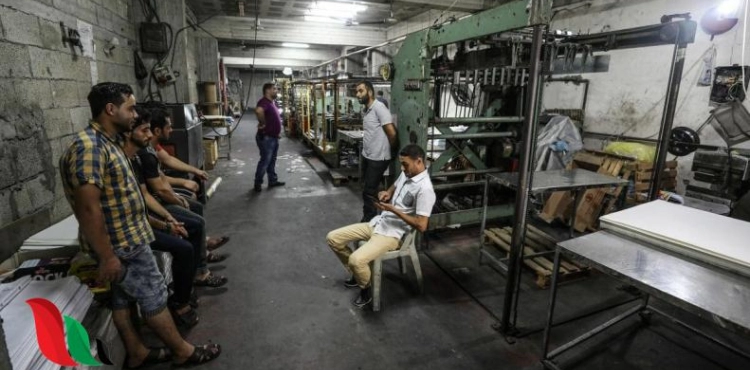The General Federation of Palestinian Industries confirmed the closure of more than 520 factories and the layoffs of thousands of workers in the Gaza Strip during 2019, which led to an increase in unemployment and social and humanitarian problems, due to wars, the blockade and the absence of support and government plans .
Mohamed Al Mansi, a member of the Board of Directors of the Federation of Industries, said in a press statement: The year 2019 was worse than 2018, as the number of factories that were closed until the end of the current year, reached 520 factories in the Gaza Strip, in addition to the factories that moved their business abroad, whether in Egypt or Jordan.
Al-Mansi pointed out that there were more than 35,000 workers in the garment and textile industry in Gaza, while now only 3 to 4,000 workers work. The number of workers in the woodworking sector exceeded 30,000, but currently only 3,000 are left. According to Mansi.
Al-Mansi stressed that the number of workers in these two sectors was increasing as a result of allowing them to export in previous periods, pointing out that the percentage of workers in the industrial sector currently does not exceed 10-15% of the percentage that was in previous years.
On the other sectors, Al-Mansi mentioned that 10-15 thousand of the workers were laid off, explaining that he was working in the private sector, "construction, commercial and industrial", for more than 130 thousand workers, adding that "the projects and support for the sector stopped, leading to The economy in construction has stopped, and factories have become partially operational.
Regarding the number of factories that are still operating in the Gaza Strip, Al-Mansi confirmed that there is no specific number, because there are factories operating seasonally and partially, adding: "However, the percentage of production capacity in factories does not exceed 20-25% in all industrial sectors in Gaza."
He reviewed the reasons that led to the deterioration and closure of factories, saying: "The three wars, the blockade, the non-export, the failure to provide the necessary raw materials, and the arbitrary measures on the crossings."
Al-Mansi noted that during the wars, the occupation destroyed all economic establishments in the Gaza Strip, which led to the stalling of the economy, stating that the affected people have not yet received any compensation or programs to re-work in the factories, "except for some sectors that received very simple aid, which does not constitute 5 -7% of the value of the damages declared. According to the forgotten.
He pointed out that the occupation prevents the entry of industrial materials necessary for many economic sectors in Gaza; which led to the stalling of the economy and the demobilization of workers and an increase in the economic burden on the government.
Al-Mansi explained that there is no government vision in Gaza to develop the economic sector, because the government does not view the industrial sector as influencing the Palestinian economy, in addition to not exempting the necessary raw materials and damaged and existing factories from taxes and not providing electric current, which resulted in stopping the economic wheel.
Regarding his vision for the coming year, Al-Mansi considered that there is no sign of hope that 2020 will be better than previous years, due to the lack of a government vision to support the industrial sector.
He described the economy in the Gaza Strip as still in place, despite the bad conditions, the siege, destruction and closure, calling on the government to develop a development plan to support the economy, stressing that if the government does not have a sustainable economic development plan, then 2020 will be worse than previous years.












